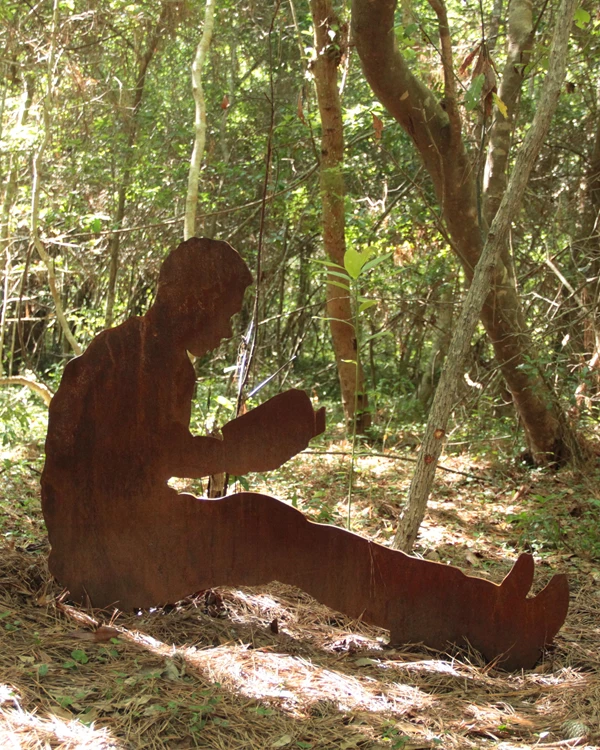Last updated: July 23, 2024
Person
Rev. London R. Ferebee

NPS Photo/Mike Anderson
Arriving on Roanoke Island as an illiterate fourteen-year-old boy and leaving three years later as an accomplished scholar and educator, Reverend London L. Ferebee exemplifies how many Freedpeople used the Roanoke Island Freedmen’s Colony as a springboard into emancipated life. The Freedmen’s Colony was designed to be a permanent settlement of self-sustaining Black folks. However, for thousands of Freedpeople, like London Ferebee, Roanoke Island was a place of temporary refuge and only one stop in a longer journey.
Young London found his way to Roanoke Island alongside his father in the early fall of 1863. Up to this time, it was a crime to teach an enslaved person how to read and write. Having spent much of his life enslaved, London had limited experience with formal education. Freshly emerged from his preteen years, young London attended school in the colony, studied fervently, and quickly rose to the top of his class.
Though he lacked extensive experience in formal school, London’s natural aptitude had carried him far even before he began learning in the schools designed for Freedpeople. When he was still quite young, London learned the art of sea navigation under his enslaver, Captain Edwin T. Cowles. His ability to quickly pick up new skills earned him Cowles’ favor. In his autobiography, London Ferebee describes Cowles as a benevolent master who was trusting and hospitable. According to Ferebee, most of the Cowles family treated him well—all except Elizabeth, the eldest daughter. London had been gifted to Elizabeth by her father, and though the two were peers, an inherent imbalance of power existed between them.
London’s relationship with Elizabeth was hostile. He suspected that Elizabeth resented him because he had inherited his mother’s assertive spirit. London’s mother, Chloe, had been enslaved to Oley Whitehurst of Currituck County but was sold to another enslaver after a defiant and ultimately violent dispute between the Whitehursts and herself. Chloe had refused to be whipped by Oley, and when Oley’s husband attempted to carry out the beating himself—this time with the threat that any further resistance would be met with a fatal gunshot wound—Chloe refused again. She gestured to her chest and said, “Shoot; that’s the only way you can whip me.” The Whitehursts sold Chloe for eleven hundred dollars with London and two of his siblings alongside her. Young London stayed with his mother until he was considered physically developed enough to be put to work elsewhere. When that day came, he was bought by the Cowles family.
Though London only saw his mother twice more before she passed away, her influence made a permanent mark on his personality and self-perception. Elizabeth Cowles experienced London’s fierce spirit when she attempted to whip him and quickly realized that London refused abuse from everyone but her father, Edwin. Young London’s strong-willed nature is what ultimately led him to emancipation.
London Ferebee remained enslaved until 1861. On August 9 of that year, he ran away in an act of self-emancipation. London sought refuge with the Union army and stayed with them in Shiloh, Camden County, North Carolina, until January 1, 1863. He reunited with his father, Abel M. Ferebee, in Elizabeth City, and the two set out for New Bern on April 19. They arrived on April 21 and spent several months in New Bern. It was there, on June 1, 1863, that young London learned his alphabet. By this time, he had developed a chronic illness called Rheumatics (rheumatoid arthritis). Nevertheless, he adapted to his circumstances in stride and remained diligent in his acquisition of new knowledge.
In September of 1863, London and his father relocated to Roanoke Island. When he arrived there, he learned under missionary teachers, including Ella Roper, Mary Burnap, and Kate Freeman. Due to the religious nature of some missionary companies, like the American Missionary Association, religion-based teachings were incorporated into many of the lessons in schools for Freedpeople. By the spring of 1864, London had demonstrated such rapid academic progress that he was made an assistant teacher and taught alongside the missionary educators. He made his first profession of religion and was elected Secretary of Church and Board of Trustees in September of the same year. In the summer of 1867, London left the island and went to Nixonton, a Pasquotank County town, where he led a private school. London had used his time on Roanoke Island to develop his faith and expertise. By 1869, his reputation for teaching and clerical leadership preceded him across eastern North Carolina.
Ferebee’s adult life was riddled with political contention and adversity. While he was still teaching in Pasquotank County, local Republican party voters expressed their desire for Ferebee to represent them in either the state legislature or the Senate. This led to the beginning of his political career. In 1872, rumors of political corruption threatened this career. After a tumultuous and long trial, Ferebee was sentenced to four years in the state penitentiary in 1874. Fortunately, his political allies convinced the governor to grant him a pardon, and he served only 27 days of the sentence. While in prison, Ferebee preached the Christian gospel. He acquired his preaching license in 1877 and applied to join the Annual Conference of the African Methodist Episcopal (AME) Church the following year. Following in the footsteps of his father, who began preaching while still enslaved, London Ferebee became a reverend and eventually an elder in the AME Zion Church.
The values instilled in him by his parents and the transformative education he received on Roanoke Island were critical to London Ferebee’s propulsion forward from one born into bondage to an educator and religious leader.
